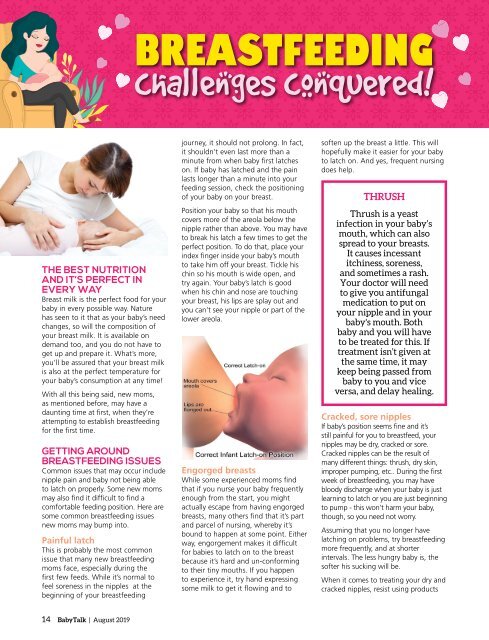BT August 2019
You also want an ePaper? Increase the reach of your titles
YUMPU automatically turns print PDFs into web optimized ePapers that Google loves.
Breastfeeding<br />
challenges conquered!<br />
The best nutrition<br />
and it’s perfect in<br />
every way<br />
Breast milk is the perfect food for your<br />
baby in every possible way. Nature<br />
has seen to it that as your baby’s need<br />
changes, so will the composition of<br />
your breast milk. It is available on<br />
demand too, and you do not have to<br />
get up and prepare it. What’s more,<br />
you’ll be assured that your breast milk<br />
is also at the perfect temperature for<br />
your baby’s consumption at any time!<br />
With all this being said, new moms,<br />
as mentioned before, may have a<br />
daunting time at first, when they’re<br />
attempting to establish breastfeeding<br />
for the first time.<br />
Getting around<br />
breastfeeding issues<br />
Common issues that may occur include<br />
nipple pain and baby not being able<br />
to latch on properly. Some new moms<br />
may also find it difficult to find a<br />
comfortable feeding position. Here are<br />
some common breastfeeding issues<br />
new moms may bump into.<br />
Painful latch<br />
This is probably the most common<br />
issue that many new breastfeeding<br />
moms face, especially during the<br />
first few feeds. While it’s normal to<br />
feel soreness in the nipples at the<br />
beginning of your breastfeeding<br />
journey, it should not prolong. In fact,<br />
it shouldn’t even last more than a<br />
minute from when baby first latches<br />
on. If baby has latched and the pain<br />
lasts longer than a minute into your<br />
feeding session, check the positioning<br />
of your baby on your breast.<br />
Position your baby so that his mouth<br />
covers more of the areola below the<br />
nipple rather than above. You may have<br />
to break his latch a few times to get the<br />
perfect position. To do that, place your<br />
index finger inside your baby’s mouth<br />
to take him off your breast. Tickle his<br />
chin so his mouth is wide open, and<br />
try again. Your baby’s latch is good<br />
when his chin and nose are touching<br />
your breast, his lips are splay out and<br />
you can’t see your nipple or part of the<br />
lower areola.<br />
Engorged breasts<br />
While some experienced moms find<br />
that if you nurse your baby frequently<br />
enough from the start, you might<br />
actually escape from having engorged<br />
breasts, many others find that it’s part<br />
and parcel of nursing, whereby it’s<br />
bound to happen at some point. Either<br />
way, engorgement makes it difficult<br />
for babies to latch on to the breast<br />
because it’s hard and un-conforming<br />
to their tiny mouths. If you happen<br />
to experience it, try hand expressing<br />
some milk to get it flowing and to<br />
soften up the breast a little. This will<br />
hopefully make it easier for your baby<br />
to latch on. And yes, frequent nursing<br />
does help.<br />
Thrush<br />
Thrush is a yeast<br />
infection in your baby’s<br />
mouth, which can also<br />
spread to your breasts.<br />
It causes incessant<br />
itchiness, soreness,<br />
and sometimes a rash.<br />
Your doctor will need<br />
to give you antifungal<br />
medication to put on<br />
your nipple and in your<br />
baby's mouth. Both<br />
baby and you will have<br />
to be treated for this. If<br />
treatment isn’t given at<br />
the same time, it may<br />
keep being passed from<br />
baby to you and vice<br />
versa, and delay healing.<br />
Cracked, sore nipples<br />
If baby’s position seems fine and it’s<br />
still painful for you to breastfeed, your<br />
nipples may be dry, cracked or sore.<br />
Cracked nipples can be the result of<br />
many different things: thrush, dry skin,<br />
improper pumping, etc.. During the first<br />
week of breastfeeding, you may have<br />
bloody discharge when your baby is just<br />
learning to latch or you are just beginning<br />
to pump - this won’t harm your baby,<br />
though, so you need not worry.<br />
Assuming that you no longer have<br />
latching on problems, try breastfeeding<br />
more frequently, and at shorter<br />
intervals. The less hungry baby is, the<br />
softer his sucking will be.<br />
When it comes to treating your dry and<br />
cracked nipples, resist using products<br />
14 BabyTalk | <strong>August</strong> <strong>2019</strong>

















